#of course morality isn't actually black and white and EVERYONE is morally gray - I just wanted to have fun with the wordplay
Explore tagged Tumblr posts
Text
Vio is grayromantic (only very rarely feels romantic attraction (it's basically just Shadow))
His friends joke that he is grayromantic (only romantically interested in those who are morally gray)
#don't take this too seriously#of course morality isn't actually black and white and EVERYONE is morally gray - I just wanted to have fun with the wordplay#four swords#vio link#vidow#shadow link#first and forever otp#I think I'm funny
125 notes
·
View notes
Note
thoughts on sunshine james
I mean, it's not canon. I can see where it comes from, but it's not the James we see in the few actual flashbacks of him.
James, in canon, was very loyal and selfless towards the people he loved the most. He treated Sirius like a brother and welcomed him into his family's home when Sirius ran away. He accepted Remus when he found out he was a werewolf and went to great lengths to help him. He fought and died in a war that he could have opted out of, probably for Lily's sake and because it was the right thing to do. And, of course, he never questioned whether he could trust Peter, to disastrous results. This is where the sunshine characterization comes from, I think.
But he was also someone who had very black and white ideas about right and wrong. The other Marauders + Lily showed a capacity to see gray area when it came to the people they were closest to, or just in general.
Lily was friends with Snape for years, even after he started hanging out with the future Death Eaters' gang, even knowing he was using Dark magic.
Remus understood that the Marauders' bullying was wrong, but did not stand up to them about it and still saw them as good people. Later in life, he was able to tolerate Snape and trust Dumbledore's judgment on him.
Sirius gave us the line "the world isn't split into good people and Death Eaters" and was pretty forgiving in his assessment of Regulus ("stupid idiot" is a very mild insult to be immediately followed by "he joined the Death Eaters")
Peter - well, Peter betrayed them to Voldemort, so obviously he wasn't very concerned with morality.
James, on the other hand? Saw the world in black and white, not a lot of nuance. He absolutely despised pure-blood rhetoric and Dark Arts and wanted nothing to do with people who aligned themselves with those things. No exceptions. And while he was generous and loyal towards his friends, he had no problem being cruel to people he deemed bad. It's very strongly implied that his reasons for targeting Snape were connected to Snape's interest in the Dark Arts and use of the word "mudblood." He felt like it was acceptable to bully Snape because Snape was not a good person.
(I think there was definitely also some personal dislike involved, which would have existed regardless, hence the "it's more the fact that he exists" comment. But still, Remus and Sirius seem pretty convinced James hating the Dark Arts had a lot to do with it).
This sort of "it's okay to do bad things to bad people" mentality is pretty much opposite of what sunshine James usually ends up looking like in fanon. Largely because sunshine James is usually paired with Regulus. And, obviously, to make that work, even with the softer versions of Regulus that usually go with the ship, James has to be a very forgiving sort of person who's willing to see nuance and give people a chance, not someone who takes a hard line stance against blood purist ideology or Dark Arts.
This is why Jegulus doesn't work for me unless it's very far removed from canon. Because if Voldemort exists, and the war is happening, and they both have their canon views on blood purity and Dark Arts and join their respective sides, I just don't see it. If Regulus survived his trip to the lake and was actively working against Voldemort in the long term, then maybe. If his views also changed quite a bit. But even then, I still think James would be starting with a negative opinion of him and it would take a lot to get him to reconsider. I'm not saying Regulus doesn't deserve a second chance, or doesn't deserve to be loved by a good person. It's just... not how I see James at all.
tl;dr - canon James is a good and loyal friend but not an all-loving ray of sunshine who wants to see the best in everyone. The sunshine characterization makes Jegulus possible with a closer-to-canon plot and setting, but it isn't really compatible with James's canon characterization.
38 notes
·
View notes
Note
yes and no, i think already past 18, you're old enough to understand shit, and hitting the early 20's you're old enough to wipe your own ass and know whats right and wrong. i think it just really depends on the person. 'you're a teenager until 25' is just eh
You're not wrong, it very much depends on the individual! Things like neurodivergence and where/how they grew up can absolutely impact what things people know and what they're capable of. And it does depend on what we're talking about they should 'know better'. Like- able-bodied, able-minded 20 year old doesn't know how to wash dishes? Cringe. Grab a sponge. Your other example, though.
The thing is. The implication that 18-22 is old enough to know 'right and wrong' is...hm. How do I put this.
If you want to argue that morality is objective, then yes- knowing what's 'right' and 'wrong' would be easy at 18. Don't murder, don't cheat, don't steal. Easy.
But the world really isn't that simple, is it? For most neurotypical people even, morality is pretty black and white until you're a teenager. And then you start getting into the weird gray areas. Is it okay to steal if your family is starving? Is it okay to kill if someone is about to kill you first? Is it alright to cheat if there's no way to succeed otherwise? Etc, etc.
Morality is weird and subjective! I'm a moral relativist and to say that everyone should have the same idea of what is 'right' and 'wrong' at eighteen is absurd! Someone raised in a very progressive household would have a very different idea about right and wrong than someone raised in a very conservative one, and to imply that they should 'know better' simply because they're an adult, as if some of these things can't take YEARS to unlearn, is not only reductive as hell, but does not encourage people to look at different viewpoints! There are a lot of situations you will run into as an adult where there is not one 'right' answer ethically, there will be a lot of situations that require multiple people to sit down and think very hard about what the 'right' answer would be.
If morality was easy, there would not be entire college courses dedicated to ethics. If morality was straightforward, we would not have a shifting understanding of the world and what is considered 'good' and 'bad'. Do you get what I'm saying. To say age is the only requirement to 'know better' in terms of morality is comically reductive at best. Morality is relative. How many people shifted from supporting Ukraine to supporting Russia? How many gay and trans people lashed out at others like them before coming out/cracking their egg because of internalized hatred?
Morality is a shifting thing. There are some things that someone could probably know better about, but myriad reasons they wouldn't. Maybe they were never given the resources (many kids are never taught about queer people and never given a way to learn more). Maybe this is a topic that has sort of...arbitrary takes to begin with (person was accused of being a pedophile for having very sfw vanilla ship art of characters who are under 18). Maybe, despite being the 'age you should know better', they genuinely do not know better, as many ACTUALLY grown adults do not, because what is considered acceptable and good and bad is not always readily apparent to everyone and shifts over time.
Listen. CAN someone be an amoral shithead as an 18-25 year old?? Absolutely. There's shitheads of all ages and moral leanings. But if there's an age where you're supposed to have morality all figured out then nobody's told me, or the ethics professors, or any philosophers for that matter. There's FOR SURE things that have a pretty clear-cut answer but assuming someone has all of them is like. why would you do that. YOU don't have all of the answers, why would they?? There's all sorts of extenuating circumstances but not giving someone the benefit of the doubt because 'they're an adult' is denying them the chance to actually learn.
TL;DR: If someone who is 18-25 is being a shithead you should call them a shithead instead of 'an adult who should know better' because morality is relative and tying it to age is arbitrary, but also you should give people the benefit of the doubt bc living your life assuming people who are wrong are inherently bad or immature isn't great
#spitblaze says things#long post#uuuuuuuh. lol im not a philosopher and i tend to ramble so#all this to say. morality is relative. go outside.
10 notes
·
View notes
Text
The Double-Speak OC Tag Meme
Tagged by @gilgamish (thank you!) I am tagging @thana-topsy
I had to think about which character to use. Most characters in my stories are not actual OCs, but very under-developed NPCs. In the end, I decided this would be a good exercise for developing my LDB for The Wives of Shor.
Figuring her out was the hardest part of plotting, because she isn't the main character. Kaidan is, and Lucien is the deuteragonist. But their motivations come from the fact that they are traveling with the Last Dragonborn, so I had to figure out what would make her compelling. Since I haven't actually published any of the story yet (I want to complete it first) here's a bit of an introduction:
Pascale Bèrard
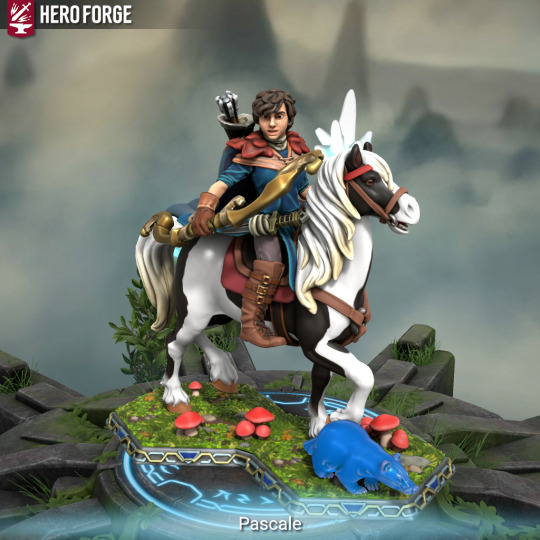
Age: 14 (She tells everyone she's 16.) (They do not believe her.)
Description: Breton from High Rock. She's got acne and doesn't know how to do her hair (curly, brown) but her family is High Rock nobility, so she's got high quality clothes and decent magical instruction before being sent to the College of Winterhold to continue her education. Too bad they didn't check to make sure none of her original hired escort was a secret Talos worshiper before sending them someplace crawling with Thalmor patrols...
What do they say they want? (i.e., what are the desires they put out into the world and have no trouble admitting) Pascale would say she wants adventure. For a variety of reasons, she was kept on a pretty short leash by her family in High Rock, and most of her life had been decided for her before she was out of single-digits. It was always known that as soon as she was old enough, she was going to be sent to the College of Winterhold to be...out of the way. She has an idea that the College is something like a convent - once she goes in, she's not going to be allowed to leave. This is of course somewhat mistaken, but no one has ever bothered to correct her misconception. She is also very vocal about wanting hot meals and clean sheets. While hunting and hawking were suitable pastimes for a young lady, her camping experience has heretofore been of the sort where your servants set up a nice pavilion for you. Traveling in Skyrim is not as much fun, and unfortunately this means she's somewhat easy to sway if some of the luxuries she was used to back home are dangled in front of her.
What do they think they want? (i.e., what are the desires they keep hidden and only admit to their closest loved ones) Pascale thinks she wants to be treated like an adult - to have her views and desires taken seriously by those around her. Fortunately she is just mature enough to know that declaring how mature she is would be the most immature thing she could do so she keeps that to herself. She also desperately wants her family to be sorry they sent her away. Let's just say that a fantasy where her father tearfully admits that she is the most powerful, the most accomplished member of their family and begs her to return, only for her to reject him is one of her favorites. She has many versions of it. Another desire is for the world to be just - as a teen, Pascale has a very black and white view of things. She has been brought up in privilege, where she was taught that if you follow all of The Rules and Live Correctly the universe will reward you. Morally gray areas, and people not doing what she thinks they should make her very frustrated.
What do they actually want? (i.e., what is something they subconsciously need, but either do not realize or cannot admit) For someone to believe in her.
24 notes
·
View notes
Text
Dissection time!
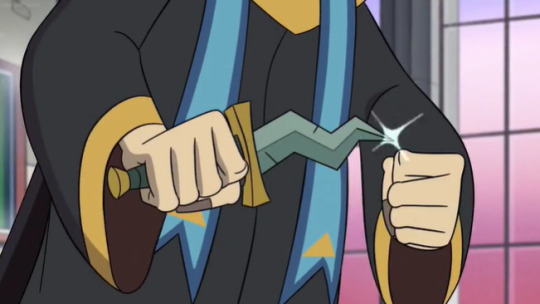
it lacks what I’m now calling the three Cs of storytelling: conflict, consequences, and character development.
Interesting thesis. Let's see how well it holds up.
In order for CF to work, you have to believe in the change Edelgard’s going to make. The problem is that Fire Emblem isn’t a game that easily includes the political theory required to tell this story to its fullest extent or to tactfully handle aspects of this plotline like blatant imperialism and nationalism.
Imperialism, yes. That's the biggest part that makes this campaign morally gray...that and being shackled to the Slithers. Nationalism? That'd be more believable if Edelgard was trying to bring back the Adrestria of the past, but she's not, since that Adrestria had problems that caused the fracturing into Faerghus and Leicester, that Adrestria was always beholden to the Church of Seiros and the Crest system, that Adrestria is the one that victimized her and her siblings. She is trying to create a new nation, a new Adrestria. This isn't about national interest, this is a full-on revolution, exemplified when she steps down from power at the end.
From acknowledging that she never considered inequality to giving all the power to one person
"Acknowledging that she never considered inequality" is not a thing that happened, ever. It's a strawman of something that happened, but not an actual thing. And when did she give "all the power to one person"? Her endings make clear there's still ministers in the Empire with their own power, and that her reforms ensure the Emperor doesn't have carte-blanche to do whatever they want without the peoples' consent, though nor are they a useless puppet like her father was rendered. You can only really dispute this if you are reading it in bad faith.
CF also ends way too early for stories like this.
Fair point, I suppose. The developers acknowledged they ran out of time with CF given that they started work on it last, which is why it ends prematurely. At the same time, it's not like the other routes end on notes where "everything is fine" either. Of course there will be more troubles ahead, nothing in war is ever "fully resolved" at the actual end of it. That's just life.
CF often undermines itself with its complete lack of nuance. Everything is far too convenient, simplified, and portrayed as very black and white.
Not only is OP projecting from how AM ended up resolving itself, but they also aren't even correct about this. Nobody ever questions themselves or Edelgard, huh? Let's see.....


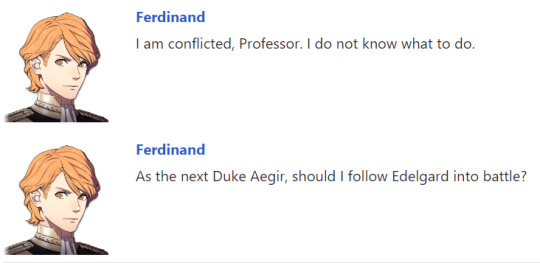

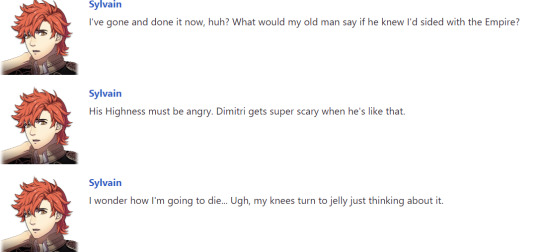
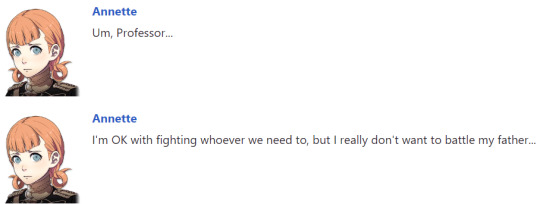

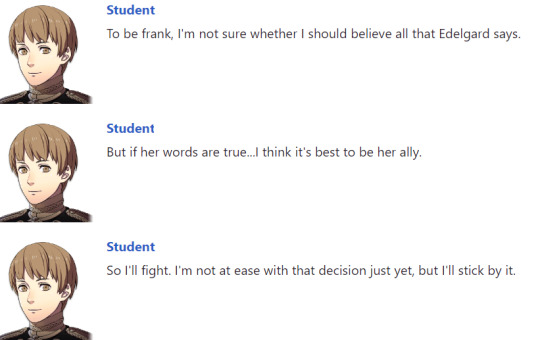
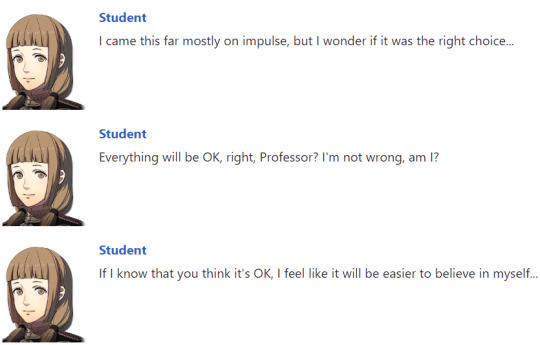




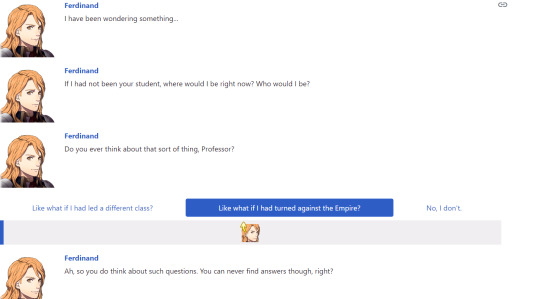
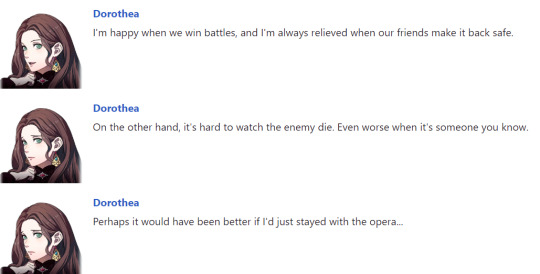


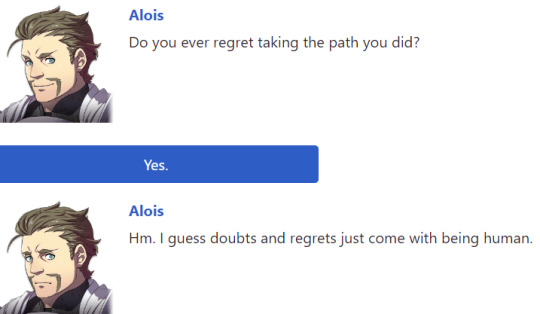




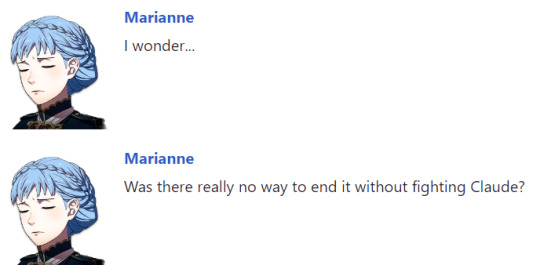
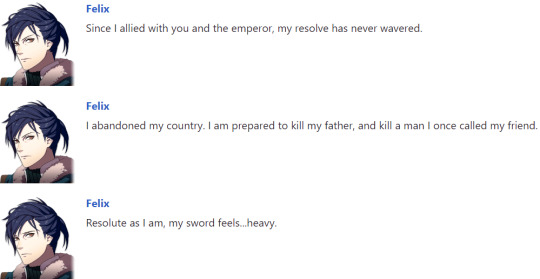
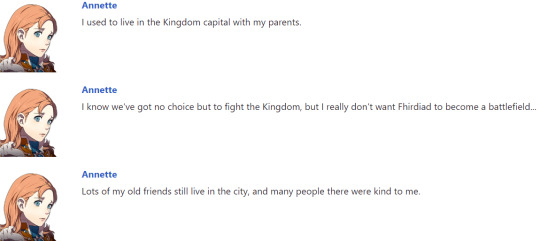

.......So yeah, this talking point's bullshit.
Killing Rhea solves the systematic abuse of power and everyone is peaches and cream about getting their nation invaded according to the ending cards.
Which is different from other routes' ending cards painting rosy pictures how?
Rhea’s an evil monster who hates humanity, Dimitri’s a vengenance-driven murder machine, and Claude’s secretly hoping to take over Fodlan himself. None of the legitimate grievances of Edelgard’s antagonists are considered so the player never has to never feel potentially bad about what they’re doing.
And that's why we have scenes like this, showing Rhea's sadness.
Or scenes like this, where Dimitri is able to die at peace with Dedue.
Or scenes like this, where regardless of whether Claude is dead or not it is emphasized how Claude took pains to choose a way that involved the less bloodshed on the Alliance's part, framing him as sympathetic.
Yep, no nuance or legitimate grievances to be seen here!
This is a stark difference from the nuanced and sympathetic treatment Edelgard gets when she’s the antagonist.
I refer to my point on Hegemon Edelgard again.
Edelgard opines about all the blood on her hands with no thoughts about who is doing the bleeding.

CF seems almost afraid of anything resembling self-reflection and opts for borderline hilarious lines screaming in neon letters “Edelgard good, everyone else bad! Please don’t look behind the curtain.”
Beyond debuking "no self-reflection" already (not so much on Edelgard's part but that's because that's her character; on the part of most of the other characters), there are plenty of lines that scream "Edelgard and Empire bad, everyone else good!" in the other routes. OP clearly doesn't have a problem with them because they are operating in extreme bad faith.
It wants the player to simultaneously believe Edelgard is taking the road to hell to rescue everyone else while treating that road like a quick stroll through a sunny forest because it doesn’t want you, the self-insert, to feel potentially bad.
No, it clearly does want you/Byleth to feel potentially bad.

But it doesn't force it, because it's offering up player choice as it should.
In CF, you take the biggest, baddest, richest country and curb-stomp everyone. Edelgard nor Byleth nor anyone else ever stops to question or disagree on anything.
Again, see above for the debunking of this claim.
Everyone you mow down is secretly awful.
....No? Just Rhea and kind of Dimitri, but Rhea being secretly awful is a thing in all routes even when you're not fighting her, while Dimitri is actually depicted better here than he is in other routes' time-skip period, still showing a sense of honor and compassion for his friends.
There’s no interesting conflict anywhere in this route.
The conflict of Byleth choosing humanity over divinity isn't interesting?
Edelgard can threaten to kill her classmates, hire known serial killers, tell everyone her enemies took actions her “allies” actually did, and never come clean to either Byleth or the Black Eagles about - well - anything, and everyone just nods along like drones. It’s like CF forgot the Flame Emperor existed, because Byleth and the Black Eagles certainly do. It’s impossible to invest in this route’s storyline when the interesting actions characters take go nowhere.
No different than with Dimitri in AM.
Characters like Ferdinand and Petra seem set up for mini-storylines of their own, but do absolutely nothing.
You need to do Supports and Paralogues for pay-offs, like with most characters.
Byleth and Hubert agree with everything Edelgard does with no conflicting interests, debates, or questions.
Did OP miss this scene?
Even Edelgard gets very little development and seems barely different from the young woman in the prologue, except now she’s not lying to Byleth - I guess. She has opened up to you and only you, self-insert.
The "Black Eagle Strike Force" is a testament to how she opened up more to the others, treating them very differently than the impersonal way she does in other routes when they're under her command. Just look at the dialogue in this scene; clearly they have a tight bond.
Overall, CF was a massive disappointment. If it had the guts to follow through on some things, it maybe could’ve been my favorite route. In the hands of writers less concerned with self-insert pandering and willing to “go there,” it would’ve had a vastly different review and ranked among my favorite stories in Fire Emblem’s franchise. Instead, we get a shallow and uninteresting let down.
Read: "CF was disappointing because it didn't have real nuance, which I define as Edelgard being unquestionably evil and wrong about everything and the story of Byleth joining hands with her needing to constantly portray that choice as miserable and angsty. It's totally pandering to the player to actually let the player choose a point of view for themselves and choose how they handle fighting on the side of the aggressor in the war! That's just stupid!"
And now some comments from the OP and others in their circle that they agree with proving this whole review is operating under bad faith to begin with:
Claude and Dimitri are capable of nuance, of seeing other people's perspectives, and wanting to work together. But Edelgard's a human bulldozer. Of course she see no value in who she fights and cannot comprehend any nuance about her situation. She's right. Everyone else is bad.
"She sees no value in who she fights and cannot comprehend nuance; she's right, everyone else is bad". Which is why she praises Claude after he dies should the player choose to kill him and also clearly respects him after talking with him should he be spared. Why she cries over Dimitri after killing him. Why she offers Rhea and the remaining members of the Church a chance at surrender without further bloodshed. Yep, total sociopath who doesn't see the value in those she fights or understand why they fight against her. Just a complete monster.
it's so peak Edelgard to disregard and demean all her enemies, seeing them as so lesser than her "brilliance", whereas everyone else is willing to sympathize with her and work with her.
Disregards and demeans all her enemies, huh? I guess I just imagined all of those lines respecting them and calling them formidable foes not to be underestimated! Silly me! But yeah, this shows the OP was anti-Edelgard going in, so of course they'll judge CF badly for daring to paint her in a positive light. They and their circle view it with a bad faith lens.
This route is not a “normal” route, it is a villain route leading, ultimately, to a Bad Ending. Characters revert to their worst selves. The lore doesn’t make any sense, characters are rightfully calling Billy an asshat and there’s nothing Billy can do, bar mowing them down.
Except the Bad Ending isn't bad given that it says Fodlan prospers and TWSITD are taken down, many of the characters are just as good and some better than elsewhere, and "Billy" can, in fact, secure outcomes other than "mowing them down" for several opponents (also, you "mow down" enemies who naturally call you an asshat for opposing them in every route!)
Because you went down this path, you think you’re acting as the hero when you’re really the villain. It’s why there’s lines hidden in the route that link CF Edelgard to the other routes, basically implying that she’s no different because of your support. Edelgard is not a character who changes, instead she tempts and corrupts those around her. It’s only by rejecting her that Byleth can be a hero.
....CF is what is totally lacking in nuance, you say?
only to be so disappointed by the lack of real follow-up on... literally anything from White Clouds
And finally, I can bring this back!
"The poorly written and cartoonishly evil TWSITD are side-lined and killed off almost by accident. Edelgard is the main villain, and is far more interesting."
So let me get this straight: this circle of fans say that CF derailing the set-up from White Clouds by having Byleth join the villain, reject the divine part of themselves and not even truly come to understand it, and having no on-screen resolution for TWSITD is bad, but that AM derailing the set-up from White Clouds by having Byleth obsessively focus on Dimitri at the expense of all else, never learn or understand a thing about the divine part of themselves (including never talking to Rhea about it because Rhea literally never appears), and having TWSITD "side-lined and killed off almost by accident" without their machinations truly being brought to light is good! You honestly couldn't hold a bigger double standard if you tried.
What else can I say but:

Crimson Flower Review
This is a long one guys.
For a bit of context about this review. I didn't play Crimson Flower first. I played all 4 routes first, beating them back-to-back one in-game "week" at a time. I've realized in the fandom that knowing someone's route order is sometimes taken into consideration, so I wanted to share that.
Oh, boy. I think the length of this review says a lot about Crimson Flower. Unfortunately, a lot of what's below is fairly negative, but that's mostly because I'm so upset at what this route could've been. Ultimately, I believe bad noise is better than no noise at all, and, say what you want about CF, but it makes a LOT of noise - good and bad - for better or worse.
Crimson Flower wants to tell a story similar to Kingdom or Legend of the Galactic Heroes where a character, dissatisfied with the injustice of the world, decides to amend that by taking everything over and fixing it themselves. It flips the usual script where the person wanting to acquire power through violent conquest is little more than a cackling villain who kicks puppies as a hobby and turns said character into an ideologically motivated one, furious at injustice rather than seeking personal gain. However, Crimson Flower really misses the mark on its execution due to the confines of current Fire Emblem's storytelling abilities, how it often undermines itself, and also because it lacks what I'm now calling the three Cs of storytelling: conflict, consequences, and character development.
Crimson Flower is too ambitious for Fire Emblem's current limitations, a point I'll touch on again in my upcoming Azure Moon review too. In order for CF to work, you have to believe in the change Edelgard's going to make. The problem is that Fire Emblem isn't a game that easily includes the political theory required to tell this story to its fullest extent or to tactfully handle aspects of this plotline like blatant imperialism and nationalism. Concrete details are dropped here and there in scattered supports, and, honestly, all of Edelgard's plans are terrible. From acknowledging that she never considered inequality to giving all the power to one person, these details only convince me she has no idea what she's doing. With Fire Emblem's current structure, I'm not sure there is a way for it to handle politics all that well, which makes me wonder why they added these details in the first place.
CF also ends way too early for stories like this. And, no, I don't mean her killing TWSITD. Yes, that's a necessary catharsis totally missing too, but what I also mean here is the complete lack of the aftereffects of her actions. CF thinks they can end it with King Louis XVI getting his head lopped off or the British squatting in India and call it a day. It ends with TWSITD unresolved, a violent aggressor forcing herself on cultures who never wanted her to lead them, and a continent suffering through five years of non-stop warfare she also forced on them. You can't just pretend everything's magically resolved after Rhea dies and that Edelgard only needed to work for another five or ten years before skipping through flower fields with Byleth and expect me to take this story seriously. At the same time, there's no real way for Fire Emblem, with its current structure, to realistically deal with any of this.
There are, though, also major failings in CF's writing that have nothing to do with Fire Emblem's structure not really allowing for some of what CF's plotline demands. It severely undermines itself, creates bizarre mood whiplashes, and is desperately lacking in conflict, consequences, and character development.
CF often undermines itself with its complete lack of nuance. Everything is far too convenient, simplified, and portrayed as very black and white. Killing Rhea solves the systematic abuse of power and everyone is peaches and cream about getting their nation invaded according to the ending cards. Rhea's an evil monster who hates humanity, Dimitri's a vengenance-driven murder machine, and Claude's scretly hoping to take over Fodlan himself. None of the legitimate grievances of Edelgard's antagonists are considered so the player never has to never feel potentially bad about what they're doing. And when what you're doing is textbook imperialism, that's a bit uncomfortable, especially when the country writing the story has yet to acknowledge their imperialistic past. This is a stark difference from the nuanced and sympathetic treatment Edelgard gets when she's the antagonist. Edelgard opines about all the blood on her hands with no thoughts about who is doing the bleeding. CF acts like there's no real cost to war because nothing lost is given any value in CF's writing, despite also wanting to act like Edelgard's made hard choices and sacrificing oh so much for the good of all (despite actually losing nothing). CF seems almost afraid of anything resembling self-reflection and opts for borderline hilarious lines screaming in neon letters "Edelgard good, everyone else bad! Please don't look behind the curtain." For a route that flirts with the idea of tackling systematic change and engages in imperialism 101, this is all incredibly disappointing and feels more like an angsty teenager's first anti-government/religion wish fulfillment wattpad fic than a story with depth.
This white/black treatment of Edelgard vs everyone else undermines the very core of the story CF is trying to tell. It wants the player to simultaneously believe Edelgard is taking the road to hell to rescue everyone else while treating that road like a quick stroll through a sunny forest because it doesn't want you, the self-insert, to feel potentially bad. This issue, both wanting a "morally grey" story but without ever letting the player feel bad, is an issue with most routes, but is felt the hardest in CF.
As a result of CF's unwillingness to engage with nuance at risk of making the player feel sad, there is a noticable lack of conflict, consequences, and character development. In CF, you take the biggest, baddest, richest country and curb-stomp everyone. Edelgard nor Byleth nor anyone else ever stops to question or disagree on anything. Nothing of value is lost. Everyone you mow down is secretly awful. There's no interesting conflict anywhere in this route. Likewise, there's no consequences. Edelgard can threaten to kill her classmates, hire known serial killers, tell everyone her enemies took actions her "allies" actually did, and never come clean to either Byleth or the Black Eagles about - well - anything, and everyone just nods along like drones. It's like CF forgot the Flame Emperor existed, because Byleth and the Black Eagles certainly do. It's impossible to invest in this route's storyline when the interesting actions characters take go nowhere.
Because this route desperately lacks conflict and consequences, none of the characters are really allowed to grow or develop. Characters like Ferdinand and Petra seem set up for mini-storylines of their own, but do absolutely nothing. Byleth and Hubert agree with everything Edelgard does with no conflicting interests, debates, or questions. Even Edelgard gets very little development and seems barely different from the young woman in the prologue, except now she's not lying to Byleth - I guess. She has opened up to you and only you, self-insert, while Hubert's impact on her life is disregarded because only you, self-insert, ever really supported and understood her.
Overall, CF was a massive disappointment. If it had the guts to follow through on some things, it maybe could've been my favorite route. In the hands of writers less concerned with self-insert pandering and willing to "go there," it would've had a vastly different review and ranked among my favorite stories in Fire Emblem's franchise. Instead, we get a shallow and uninteresting let down.
145 notes
·
View notes
Note
(this isn't a submission) i just wanted to say thank you for posting such a cool response to that one person asking how Hanahaki can be made unproblematic. i'm aro and honestly really like the Hanahaki trope- i'm writing my own novella about someone getting Hanahaki for someone who's aro and it talks a lot about the problematic aspects of it, so it was really cool to see your reply putting things i've been thinking into words. especially when so many other aro ppl hate the trope. wishing u well
[empty paragraph in case tumblr eats it]
(response in question linked here)
hi!
honestly, I think as a trope it makes so very much sense that hanahaki appeals to people - it’s sort of a combination of many people’s fears, an externalization of feelings that are hard to describe, and situations many people experience something reminiscent of. those categories can be fun playgrounds for plots. and, honestly, I shied away from my main point in that initial response. I worry that when we care about things being “unproblematic”, we’ve well... lost the plot of social activism.
when we refuse to talk about nuance, the why, the how, the ways in which people may respond differently to the same situation, etc, the gray zones become uncomfortable and unspeakable. all too often, I feel like that gray zone is microaggressions and history and intersections. I totally get that sometimes, it’s nice to just have a Good Guy and a Bad Guy. but I worry that people forget that it’s important to still talk about what makes things good and bad. we can’t just... label everything as one or the other.
To connect that back - when we try to make a trope that by nature was always about being problematic (ie, always about uncomfortable feelings, always about a lose/lose situation and wondering, can we win it, and what does that take?) “unproblematic”, we ignore the history. It feels much to me like the ways in which my K-12 education pretended that all of history was actually about people caring deeply about others. “European explorers wanted to spread Christianity because they wanted everyone to go to heaven!” It certainly, certainly had nothing to do with anything else, ever, in those descriptions. They read as unproblematic - you weren’t horrifying kids, right? You kept it to a maturity they could appreciate? But what were we avoiding? What were we ignoring as problems always, always for later, which never came?
I like letting people explore those topics. I want people to question why things are good and bad and in between. I hate the focus on “problematic” vs “unproblematic” because black and white morality doesn’t teach.
Are you more likely to follow a safety rule - especially one that you may not feel inclined to follow - because you were told “doing the thing is bad”, or “here’s why this is in place”? Or, say this rule is weirdly... vague, or too specific. “Do not operate heavy machinery while starting this medication until you know how it affects you” - how is the average person supposed to know that includes driving cars without a nuanced discussion? “Use two pairs of gloves while cleaning this machinery” - how were you to know that it was determined that those two pairs would protect you for long enough that, if you forgot to unplug the machine, you could probably respond in time to not lose a finger if you accidentally leaned and turned the machine on? Not everyone will listen, of course, and you probably need to prioritize when you introduce nuance and when you don’t. But.
Nuance and discussion exist for a reason - and while fiction isn’t obligated to portray it, we do ourselves a disservice when we pretend there was never any nuance to discuss.
- mod kee
#not aro culture#aro#aromantic#actually aro#actually aromantic#ask#mod kee#hanahaki#hi i'm mod kee and i go on very long tangents about internet purity culture with minimal prompting#irl i'll see if you're comfortable first#but basically i've never subscribed to a binary in my life and i'm not about to start now#Anonymous
117 notes
·
View notes